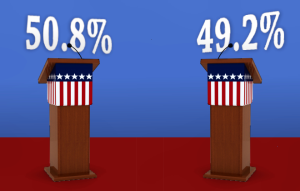For months now, many of us have been barraged with ongoing media about presidential polls – something that we can all expect to escalate as caucuses and primaries occur.
caucuses and primaries occur.
First, what are the differences between these two methods – polling versus surveys?
Polling is frequently employed in political races to obtain immediate feedback regarding generally one or at maximum two question areas with limited analysis of data. Some are well-structured and want to get truthful answers as to voter preference for a particular candidate. At their worst, many are a form of push polls that attempt to operate under the guise of real market research, with their single goal being to sway peoples’ opinions as opposed to acquiring information.
Many other polls popular with media outlets (think of the polls magazines, newspapers, and TV stations employ) are truly just for entertainment value or a method to create stories that can be broadcast. They totally lack reliability and an honest sampling plan. And, of course, there are pop up or internet polls geared only toward one thing – getting your contact information and/or selling.
SRA surveys are generally conducted to gather statistically valid data to test awareness among targeted populations regarding products, services, or programs geared toward them and to determine where our clients stand in relationship to the competition. SRA also develops and launches surveys designed to obtain customer satisfaction levels and resultant NPS (Net Promoter Scores) which function as a leading indicator of an organization’s ability to gain market share and create sustainable growth.
Our clients use surveys to obtain needed strategic insights on the viability of a new product or service before an expensive launch. In addition, surveys are used to obtain reaction to and likely success/direction of a rebranding of an entire organization or an existing product or service.
Surveys are significantly different than polls since they usually address multiple question areas or concepts and generally result in a comprehensive analysis of what the data means with recommended direction provided.
Market research surveys are guided by:
- Development of a sound sample that will allow for detailed analysis and statistical validity of no less than 95% +/- 5% variance
- Design of a questionnaire that is impartial and worded in such a way that all respondents process the questions in an identical manner
- Processes put in place that ensure respondent anonymity
- Usage of multiple methods to ensure representation of the targeted audiences (these may include, but are not limited to, cell phone, online, landline, intercept, etc.)
- Stringent training and monitoring of interviewers
- Client access to monitor interviews live
- Total transparency which entails client receipt of disposition of all contacts made and completions
- Adherence to quality standards and guidelines developed by the leading survey research trade organization in the country – CASRO (Council of American Survey Research Organizations, www.casro.org)
As to the reliability of polls and surveys, this rests totally with the skill of the people involved in the process and their ability to design and launch an impartial questionnaire in an ethical and well thought out manner that carries statistical validity, as well as their ability to navigate the changing environment of how to best reach qualified respondents.
There are many polls where the accuracy has been abysmal. One example is the 1992 presidential race where it was predicted Bill Clinton had no chance of beating George H.W. Bush who was leading Clinton by over 20% at one point. As we know, Bush did not win that election. However, data does show that many Gallup polls over the last four presidential elections were quite accurate, with deviations of less than 2% from election results.
The viability of market research surveys is strong, particularly when an organization sponsoring the research is using a CASRO firm (of which SRA is a member) that abides by the highest levels of quality and ethics. The ability to replicate surveys to track results over time is another indicator of accuracy. The most valuable indicator of SRA surveys is we provide documentable data that helps our clients succeed.
——————————————————————————————————————————————–
SRA Research Group is a solution-based consultancy with the vision for our clients based upon the fundamentals we continue to deliver – Strategy, Results and Achievement – since our founding 30 years ago. Our firm provides exemplary research services and support to organizations geared toward understanding and measuring how to best keep their customers and clients satisfied. We are a trusted partner that helps frame issues, develop solutions, and refine opportunities.
Contact SRA at (561) 744-5662
Visit our website at www.sra-researchgroup.com
Follow us on Twitter @SRAResearchGp
Follow us on LinkedIn at https://www.linkedin.com/company/sra-research-group


